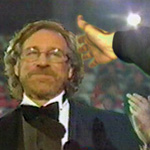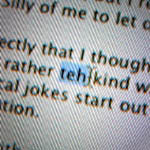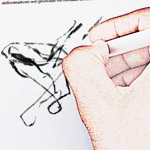 It is Los Angeles, 1997, and before the gathered crowd I find my attention consumed by a single thought. In my mind the vision is clear: my hand reaching out and touching Steven Spielberg’s head. What troubles me most about the thought is that I’m currently standing just a few feet from the man himself. Clearly this is as close as I might hope to come to touching Spielberg’s head, which makes the temptation–as irrational as it may be–all the more seductive.
It is Los Angeles, 1997, and before the gathered crowd I find my attention consumed by a single thought. In my mind the vision is clear: my hand reaching out and touching Steven Spielberg’s head. What troubles me most about the thought is that I’m currently standing just a few feet from the man himself. Clearly this is as close as I might hope to come to touching Spielberg’s head, which makes the temptation–as irrational as it may be–all the more seductive.
The alternative? The knowledge that I once had the opportunity to touch Steven Spielberg’s head, but didn’t. I work for a small technology company, and we’ve affiliated ourselves with Spielberg’s Starbright Foundation to demonstrate how our product can engage sick children as they participate in virtual communities. During the program’s commencement ceremony I find myself, along with the rest of my team, standing in an impromptu receiving line around the dais, and there is Spielberg working his way down the line.
The desire to touch Spielberg’s head is new. In fact, even now the thought is laced with lightning bolt warnings of conscience. “You mustn’t do it,” my mind tells me. “You mustn’t even think it!” Because the thought, I cannot deny, grows more delicious by the second. The very wrongness of it adds zest.
And yet how can something so wrong be so very easy to do? Shouldn’t verboten acts be extraordinarily difficult to accomplish? Otherwise, a simple change in the direction of the winds of impulse may be enough to turn a passing thought into a dark deed. Yet there he is, Spielberg, growing closer with each moment. Now I can see the pores in his nose, he is so close.
The crux of the problem is that people’s heads are restricted zones among strangers, such that even something as innocent as a touch would be viewed as a violation, and socially unredeemable. Meanwhile, here we are about to shake hands.
He’s now standing one person away, and I’m in a state of self-arrest, my enthusiasm momentarily bridled, yet wild still. Perhaps I can release some of the pent up energy by making a sudden confession to him right here. But even my telling him about this would probably not serve to establish any kind of healthy bond between us. “Hi, Steven. Um, I don’t want you to be alarmed, but I was just thinking about touching your head.” Then I would put my hands up in innocence to show him I meant no harm. “I won’t do it though, so don’t worry.”
Oh, there’s no way I could undo that. The time it would take to win his trust wouldn’t even be worth the effort, and he would quickly move on to the next line member, and I would be left forever branded: weirdo.
But I consider the thought anyway: What if I said that, and couldn’t retract it, and was forced to just power through? How would I manage that?
I imagine grabbing Spielberg in a bear hug, and his bodyguards tear toward me from across the stage. “Don’t do it,” I say. “Don’t do it!” And they pause, just long enough, their eyes darting over the dais to better gauge the most effective way to tear my arms from their sockets.
Spielberg, surprisingly docile, says, “You’re not going to do something silly?”
I laugh. “I know this seems rash, or crazy even.” Tactical error–I shouldn’t have used that word. It’s almost impossible to recover once you’ve uttered it, like shrieking, “I’ve got a bomb,” as you sprint through the airport. “Scratch that,” I say. “What I mean to say is that I see what you’re thinking. I mean–no, that sounds crazy too, and it’s not what I meant. I mean I know how this seems to you. So just know that I wouldn’t do this unless I had a plan. I know what I’m doing, and what I must do. I have it all worked out, and by the end of this you’ll realize that I’m harmless, and a friend, really.” I will bring us all the way back around to polite civility if I have to threaten everyone in the auditorium to do it.
Thus is my mind tormented, and I’m horrified by the thoughts I’ve conjured, the inescapable, unrelenting doom of the scenario. So why do I put myself through this? Because I am fascinated–absolutely obsessed–by the thin membrane between those brief moments in time that pass unnoticed and absolute mayhem. It doesn’t take much to go from one to the other, so why is it so difficult to bring order back from chaos? Because chaos is where it’s all headed, baby, that’s why. And, this in mind, it is clear that I should not be in charge of my actions, because that moment-to-moment choice to color within the lines is too great a responsibility.
By the time the director’s eyes finally flick up to mine in greeting–he’s a short guy it turns out–my face is a mask of trauma. Fortunately he takes this for stage fright, touches my arm as he shakes my hand, and leans in. “Don’t worry,” he says, “they’re all thinking of the children.”
I’m quite sure the audience is thinking about the children, but thanks only to the strength of my will.
 Listen to each commercial closely and you’ll hear them. There: the rin tinn fuckulation of the ever-fucking bells. You’re not meant to listen to commercials like that, not with your full attention. They’re supposed to wash over you, to leave you with that unique feeling of chipper inadequacy. But sometime after Labor Day the marketeers start slipping in the bells, subtle at first, like global warming. Until, by mid December, they’re all you can hear. Ad agencies believe that December bells in commercial soundtracks are as potent as Barry White music on a third date.
Listen to each commercial closely and you’ll hear them. There: the rin tinn fuckulation of the ever-fucking bells. You’re not meant to listen to commercials like that, not with your full attention. They’re supposed to wash over you, to leave you with that unique feeling of chipper inadequacy. But sometime after Labor Day the marketeers start slipping in the bells, subtle at first, like global warming. Until, by mid December, they’re all you can hear. Ad agencies believe that December bells in commercial soundtracks are as potent as Barry White music on a third date. Peering over the shoulders of the brothel newsletter’s editors each day, it finally dawned on me that a person’s editing style is a component of their psychological makeup. Based on my observations–field research, if you will–I methodically codified certain basic personality traits by matching my coworkers’ various methods of typo correction to their respective psychological tendencies. Of course only a certain kind of person is drawn to publish a brothel newsletter at all. Through the years there were always those who questioned, right to my face, the legitimacy of a brothel newsletter, but to those people I posed the question: which brothels have you been soliciting? Certainly not one that has to its name three Peabody Awards for Excellence in Cathouse Media. The Receptive Feline is not your father’s brothel, and that’s all I have to say on that matter.
Peering over the shoulders of the brothel newsletter’s editors each day, it finally dawned on me that a person’s editing style is a component of their psychological makeup. Based on my observations–field research, if you will–I methodically codified certain basic personality traits by matching my coworkers’ various methods of typo correction to their respective psychological tendencies. Of course only a certain kind of person is drawn to publish a brothel newsletter at all. Through the years there were always those who questioned, right to my face, the legitimacy of a brothel newsletter, but to those people I posed the question: which brothels have you been soliciting? Certainly not one that has to its name three Peabody Awards for Excellence in Cathouse Media. The Receptive Feline is not your father’s brothel, and that’s all I have to say on that matter. It is Los Angeles, 1997, and before the gathered crowd I find my attention consumed by a single thought. In my mind the vision is clear: my hand reaching out and touching Steven Spielberg’s head. What troubles me most about the thought is that I’m currently standing just a few feet from the man himself. Clearly this is as close as I might hope to come to touching Spielberg’s head, which makes the temptation–as irrational as it may be–all the more seductive.
It is Los Angeles, 1997, and before the gathered crowd I find my attention consumed by a single thought. In my mind the vision is clear: my hand reaching out and touching Steven Spielberg’s head. What troubles me most about the thought is that I’m currently standing just a few feet from the man himself. Clearly this is as close as I might hope to come to touching Spielberg’s head, which makes the temptation–as irrational as it may be–all the more seductive. There’s blood under my fingernails, and I’m trapped. The meeting with my supervisor, informal and at my desk, was going well until I swiped at an itch on my forehead, which lately has been pulling double-duty as a proving ground for novice mosquitos. As nights progress, anything left exposed is fair game for the winged beasties, and the result is that my upper forehead resembles one of the photographs sent back by the Mars Rover. My supervisor was ticking down the remaining details of the upcoming project, bracketing each item on her printout, when I felt the first trickle on my forehead.
There’s blood under my fingernails, and I’m trapped. The meeting with my supervisor, informal and at my desk, was going well until I swiped at an itch on my forehead, which lately has been pulling double-duty as a proving ground for novice mosquitos. As nights progress, anything left exposed is fair game for the winged beasties, and the result is that my upper forehead resembles one of the photographs sent back by the Mars Rover. My supervisor was ticking down the remaining details of the upcoming project, bracketing each item on her printout, when I felt the first trickle on my forehead. Over the course of a few years, my friend and I developed a telephone tradition whereby we would randomly hang up on each other. Actually, it began as any evolutionary development does: with an accident. A terrific storm came through and snatched phone service away, and I found myself talking to static. Nothing remarkable, but I believe the germ of an idea had been planted. About a week later the line was severed again as I was in the middle of a thought. This time there wasn’t a storm cloud to be seen, and the phone was in perfect working order.
Over the course of a few years, my friend and I developed a telephone tradition whereby we would randomly hang up on each other. Actually, it began as any evolutionary development does: with an accident. A terrific storm came through and snatched phone service away, and I found myself talking to static. Nothing remarkable, but I believe the germ of an idea had been planted. About a week later the line was severed again as I was in the middle of a thought. This time there wasn’t a storm cloud to be seen, and the phone was in perfect working order. Lord of his demesne, the bookstore proprietor fixes me in his gaze as I fill out the form. More accurately, he watches my hand, scrutinizes its every movement. This is an intense man covered in tattoos, an unlikely combination. You’d think that someone who can take a needle in the eyelid might have a more placid bearing. But then again, maybe his friends did this to him as a prank after one of his late-evening post-binge blackouts.
Lord of his demesne, the bookstore proprietor fixes me in his gaze as I fill out the form. More accurately, he watches my hand, scrutinizes its every movement. This is an intense man covered in tattoos, an unlikely combination. You’d think that someone who can take a needle in the eyelid might have a more placid bearing. But then again, maybe his friends did this to him as a prank after one of his late-evening post-binge blackouts. Dear Gloria, your erratic vibrations are draining my very life force. The way you churn your lips as you whisper to yourself is–I assure you–unnecessary, unless it is your conscious desire to amass the impressive volume of foam spittle at the corners of your mouth, which I witness daily. Also, though the industrial cleaning agent you wear for perfume makes your eyes water without abatement, I hope that, each day anew, you’ll reconsider your decision to carry around a blotter kleenex that you nervously crumple, and rumple, and work, and work, and work, and work, until little balls of ruined fluff drop like silken spider eggs from between your palsied fingers. I hope you will not think me cruel for mentioning these things, but I’ve found that the way you obsessively touch anything that comes to your attention–picking it up, putting it down, moving it just slightly, or just touching it… touch… touch…–is stirring up a demon inside me whose intentions I am not yet entirely clear on.
Dear Gloria, your erratic vibrations are draining my very life force. The way you churn your lips as you whisper to yourself is–I assure you–unnecessary, unless it is your conscious desire to amass the impressive volume of foam spittle at the corners of your mouth, which I witness daily. Also, though the industrial cleaning agent you wear for perfume makes your eyes water without abatement, I hope that, each day anew, you’ll reconsider your decision to carry around a blotter kleenex that you nervously crumple, and rumple, and work, and work, and work, and work, until little balls of ruined fluff drop like silken spider eggs from between your palsied fingers. I hope you will not think me cruel for mentioning these things, but I’ve found that the way you obsessively touch anything that comes to your attention–picking it up, putting it down, moving it just slightly, or just touching it… touch… touch…–is stirring up a demon inside me whose intentions I am not yet entirely clear on.